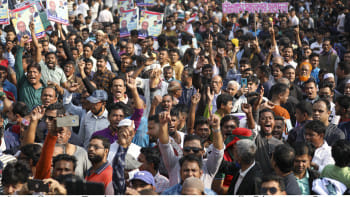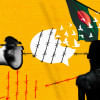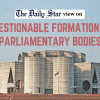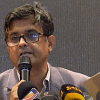Which path do we want to be on?

This year will define whether Bangladesh can preserve its institutional ambitions towards being a liberal democracy. But the values that were enshrined by Bangladesh's founding architects within the framework of a robust constitutional setup are being redefined in a discreet, dangerous and inconspicuous manner – firmly putting democracy at odds with development.
This brand of political illiberalism, methodically and deliberately camouflaged by ruling elites under the aegis of economic growth, indicates that there is enough apprehension surrounding Bangladesh signing a death warrant for democratic practices.
The country is now preparing for a litmus test in its quest to determine whether it has both the capacity and the political will to refurbish a fragmented, divisive, fragile and profoundly prejudiced electoral system.
Politically, while younger Bangladeshis empathise with the historical struggles of the ruling Awami League and resonate with Sheikh Hasina's developmental agendas, they are equally conscious in holding the regime that, for many, have governed during the totality of their adult life, accountable for their actions.
For those born after 1994, the right to vote has neither been guaranteed nor realistically ensured by the state. The general elections of 2014 and 2018 were to act as inflection points in Bangladesh's history in a way, transitioning the baton of political engagement from the older generation to the youth.
Yet, both elections failed in respecting democratic standards. Blame can be attributed to both major parties, but the fact remains that 2014 saw a voter turnout of less than 40 percent, with more than 50 percent of MPs being elected uncontested.

On the other hand, 2018 was a debacle of another kind. The Election Commission indicated a turnout of 80 percent, with the AL seemingly attaining over 74 percent of the votes. The official framing of the election was contrary to what political observers, journalists and analysts were reporting from polling booths across the country. Large-scale rigging, voter intimidation, and pre-election stuffing of ballot boxes represented the unfortunate tale of 2018, and one can stipulate that it was indeed a "managed" electoral exercise.
The problem with holding one-sided elections, irrespective of how well the country may be performing on the economic front, is that it moulds a serious deficit of public trust towards the government and its institutions. Given that the AL has been in power since 2009, and in admitting that Sheikh Hasina's tenure has been a game-changer in setting a policy tone for tangible investments in infrastructure, the liability of engineering a disengaged voting base (within the purview of an infant democracy in decline), must also be attributed towards the ruling party.
It is imperative to bring voters to conversations pertaining to the 2023 general elections. Both the Awami League and the BNP should recalibrate their political focus away from events of the yesteryears, and drive forward alternative policy visions for the country. One has doubts over whether these parties actually care about the sanctity of the vote – but this should not deter citizens from voicing their demands regarding free, fair and credible elections.
Some may ask, if countries like China can choose to have a centralised one-party system, which drives forward economic development, why can't Bangladesh?
For one, Bangladesh is no China, and the affinity that many political leaders have towards autocrats like Xi Jinping or Vladimir Putin is ill-informed and disturbing.
Bangladesh need only remind itself of the array of sociopolitical reasons referenced by Bangabandhu and the Awami League in seeking independence from the Pakistani military architecture to understand why being a democracy is a quintessential component of the very idea of Bangladesh.
An increasingly hardline Awami League has aggressively leveraged its regulatory regimes, including the DSA, to suppress individual and collective forms of political dissent – showcasing a tendency to monopolise legal devices and networked technologies with the intention of consolidating power and preserving the dwindling legitimacy of the state.
Given the extensive use of rigid digital security rules to selectively suppress dissent, it is not a stretch to contend that Dhaka might be mirroring Beijing in its approach towards governance and policymaking.
With new regulations on digital platforms expected to guarantee the government's authority and their right to act as intermediaries in removing/blocking content deemed "anti-state," Bangladesh is codifying authoritarian tendencies and social control within its digital landscape. The tilt towards China, in conjunction with the nation's poor experiences with the 2014 and 2018 general elections, emphasises why 2023 is going to be a make or break year for Bangladesh.
The Bangladeshi public deserves to vote in free, fair and credible elections – and it is the moral and constitutional duty, predominantly of the ruling party, to facilitate this. Otherwise, for the third time in a row, Bangladeshis will be denied the chance to exercise their voting rights, and the country's liberal democratic aspirations will be overshadowed by a natural transition towards an alarming brand of digital authoritarianism.
Mir Aftabuddin Ahmed is a columnist and policy analyst. He can be reached at [email protected]

 For all latest news, follow The Daily Star's Google News channel.
For all latest news, follow The Daily Star's Google News channel. 










Comments